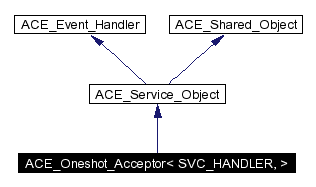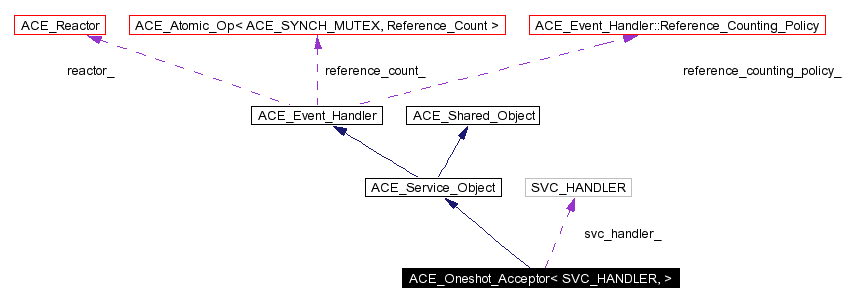
#include <Acceptor.h>
Inheritance diagram for ACE_Oneshot_Acceptor< SVC_HANDLER, >:


Public Types | |
| typedef ACE_PEER_ACCEPTOR_ADDR | addr_type |
| typedef ACE_PEER_ACCEPTOR | acceptor_type |
| typedef SVC_HANDLER | handler_type |
| typedef ACE_TYPENAME SVC_HANDLER::stream_type | stream_type |
Public Methods | |
| ACE_Oneshot_Acceptor (void) | |
| Constructor. | |
| ACE_Oneshot_Acceptor (const ACE_PEER_ACCEPTOR_ADDR &local_addr, ACE_Reactor *reactor=ACE_Reactor::instance(), ACE_Concurrency_Strategy< SVC_HANDLER > *=0) | |
| int | open (const ACE_PEER_ACCEPTOR_ADDR &, ACE_Reactor *reactor=ACE_Reactor::instance(), ACE_Concurrency_Strategy< SVC_HANDLER > *=0) |
| virtual | ~ACE_Oneshot_Acceptor (void) |
| Close down the <Oneshot_Acceptor>. | |
| virtual int | accept (SVC_HANDLER *=0, ACE_PEER_ACCEPTOR_ADDR *remote_addr=0, const ACE_Synch_Options &synch_options=ACE_Synch_Options::defaults, int restart=1, int reset_new_handle=0) |
| virtual int | cancel (void) |
| Cancel a oneshot acceptor that was started asynchronously. | |
| virtual | operator ACE_PEER_ACCEPTOR & () const |
| Return the underlying <PEER_ACCEPTOR> object. | |
| virtual ACE_PEER_ACCEPTOR & | acceptor (void) const |
| Return the underlying <PEER_ACCEPTOR> object. | |
| virtual int | close (void) |
| Close down the <Oneshot_Acceptor>. | |
| void | dump (void) const |
| Dump the state of an object. | |
Public Attributes | |
| ACE_ALLOC_HOOK_DECLARE | |
| Declare the dynamic allocation hooks. | |
Protected Methods | |
| virtual int | activate_svc_handler (SVC_HANDLER *svc_handler) |
| int | shared_accept (SVC_HANDLER *svc_handler, ACE_PEER_ACCEPTOR_ADDR *remote_addr, ACE_Time_Value *timeout, int restart, int reset_new_handle) |
| virtual ACE_HANDLE | get_handle (void) const |
| Returns the listening acceptor's <ACE_HANDLE>. | |
| virtual int | handle_close (ACE_HANDLE=ACE_INVALID_HANDLE, ACE_Reactor_Mask=ACE_Event_Handler::ALL_EVENTS_MASK) |
| virtual int | handle_input (ACE_HANDLE) |
| virtual int | handle_timeout (const ACE_Time_Value &tv, const void *arg) |
| Called when an acceptor times out... | |
| virtual int | init (int argc, ACE_TCHAR *argv[]) |
| virtual int | fini (void) |
| virtual int | info (ACE_TCHAR **, size_t) const |
| Default version returns address info in <buf>. | |
| virtual int | suspend (void) |
| virtual int | resume (void) |
Private Methods | |
| int | register_handler (SVC_HANDLER *svc_handler, const ACE_Synch_Options &options, int restart) |
Private Attributes | |
| SVC_HANDLER * | svc_handler_ |
| Hold the svc_handler_ across asynchrony boundaries. | |
| int | restart_ |
| Hold the restart flag across asynchrony boundaries. | |
| ACE_PEER_ACCEPTOR | peer_acceptor_ |
| Factory that establishes connections passively. | |
| ACE_Concurrency_Strategy< SVC_HANDLER > * | concurrency_strategy_ |
| Concurrency strategy for an Acceptor. | |
| int | delete_concurrency_strategy_ |
This class works similarly to the regular <ACE_Acceptor>, with the following differences: 1. This class doesn't automagically register <this> with the <ACE_Reactor> since it expects to have its <accept> method called directly. However, it stashes the <ACE_Reactor> pointer away in case it's needed later to finish accepting a connection asynchronously. 2. The class doesn't need an <ACE_Creation_Strategy> (since the user supplies the SVC_HANDLER) or an <ACE_Accept_Strategy> (since this class only accepts one connection and then removes all traces of itself from the <ACE_Reactor> if it was registered for asynchronous accepts).
|
|||||
|
|
|
|||||
|
|
|
|||||
|
|
|
|||||
|
|
|
||||||||||
|
Constructor.
|
|
||||||||||||||||||||
|
Initialize the appropriate strategies for concurrency and then open the <peer_acceptor> at the designated <local_addr>. Note that unlike the <ACE_Acceptor> and <ACE_Strategy_Acceptor>, this method does NOT register <this> acceptor with the <reactor> at this point -- it just stashes the <reactor> away in case it's needed later. |
|
||||||||||
|
Close down the <Oneshot_Acceptor>.
|
|
||||||||||||||||||||||||||||
|
Create a <SVC_HANDLER>, accept the connection into the <SVC_HANDLER>, and activate the <SVC_HANDLER>. |
|
||||||||||
|
Return the underlying <PEER_ACCEPTOR> object.
|
|
||||||||||
|
Bridge method for activating a <svc_handler> with the appropriate concurrency strategy. Default behavior is to activate the <SVC_HANDLER> as a "passive object." However, subclasses can override this strategy to do more sophisticated concurrency activations (such as creating the <SVC_HANDLER> as an "active object" via multi-threading or multi-processing). |
|
||||||||||
|
Cancel a oneshot acceptor that was started asynchronously.
|
|
||||||||||
|
Close down the <Oneshot_Acceptor>.
|
|
||||||||||
|
Dump the state of an object.
|
|
||||||||||
|
Default version does no work and returns -1. Must be overloaded by application developer to do anything meaningful. Reimplemented from ACE_Shared_Object. |
|
||||||||||
|
Returns the listening acceptor's <ACE_HANDLE>.
Reimplemented from ACE_Event_Handler. |
|
||||||||||||||||
|
Perform termination activities when <this> is removed from the <reactor>. Reimplemented from ACE_Event_Handler. |
|
||||||||||
|
Accept one connection from a client and activates the SVC_HANDLER. Reimplemented from ACE_Event_Handler. |
|
||||||||||||||||
|
Called when an acceptor times out...
Reimplemented from ACE_Event_Handler. |
|
||||||||||||||||
|
Default version returns address info in <buf>.
Reimplemented from ACE_Shared_Object. |
|
||||||||||||||||
|
Default version does no work and returns -1. Must be overloaded by application developer to do anything meaningful. Reimplemented from ACE_Shared_Object. |
|
||||||||||||||||||||
|
Initialize the appropriate strategies for concurrency and then open the <peer_acceptor> at the designated <local_addr>. Note that unlike the <ACE_Acceptor> and <ACE_Strategy_Acceptor>, this method does NOT register <this> acceptor with the <reactor> at this point -- it just stashes the <reactor> away in case it's needed later. |
|
|||||||||
|
Return the underlying <PEER_ACCEPTOR> object.
|
|
||||||||||||||||||||
|
Insert ourselves into the <ACE_Reactor> so that we can continue accepting this connection asynchronously. This method should NOT be called by developers directly. |
|
||||||||||
|
Default version does no work and returns -1. Must be overloaded by application developer to do anything meaningful. Reimplemented from ACE_Service_Object. |
|
||||||||||||||||||||||||||||
|
Factors out the code shared between the <accept> and <handle_input> methods. |
|
||||||||||
|
Default version does no work and returns -1. Must be overloaded by application developer to do anything meaningful. Reimplemented from ACE_Service_Object. |
|
|||||
|
Declare the dynamic allocation hooks.
|
|
|||||
|
Concurrency strategy for an Acceptor.
|
|
|||||
|
1 if Acceptor created the concurrency strategy and thus should delete it, else 0. |
|
|||||
|
Factory that establishes connections passively.
|
|
|||||
|
Hold the restart flag across asynchrony boundaries.
|
|
|||||
|
Hold the svc_handler_ across asynchrony boundaries.
|
 1.2.18
1.2.18